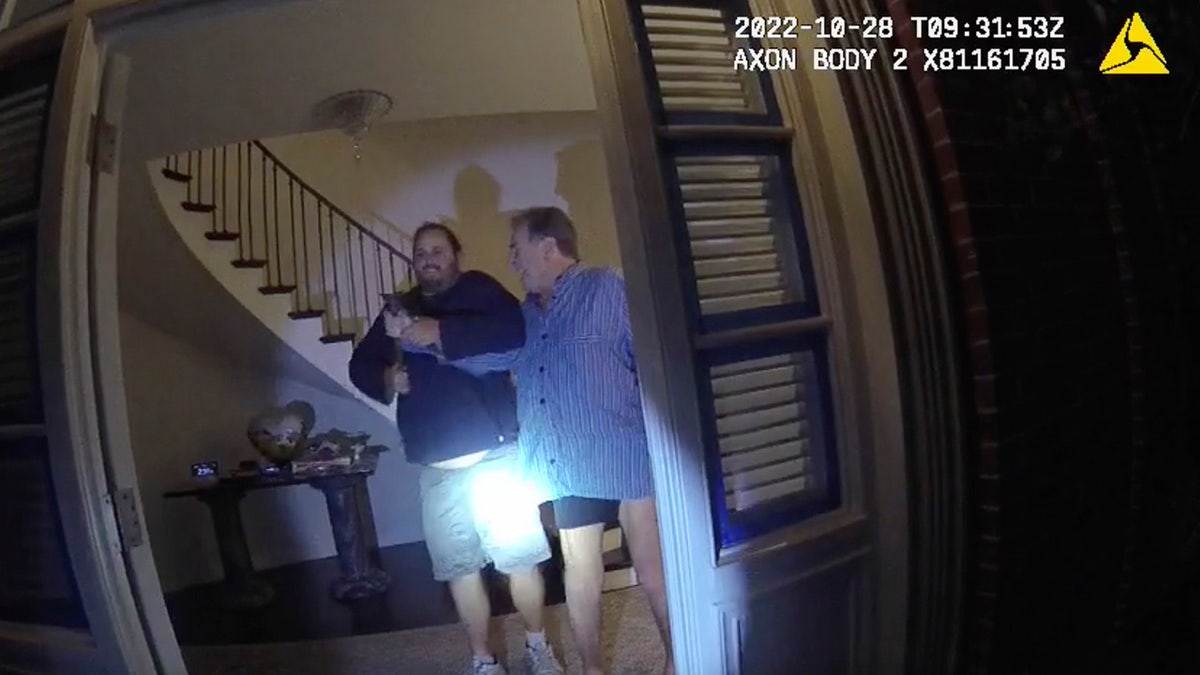Guilty verdict in hammer attack on Paul Pelosi
FOX News senior correspondent Claudia Cowan has the latest on Paul Pelosi attack suspect David DePape being found guilty in federal trial on 'The Story.'
The Justice Department is seeking a 40-year sentence for David DePape under a "terrorism enhancement" in connection to the hammer attack on Paul Pelosi at his and his wife, Rep. Nancy Pelosi’s California home.
In a memo filed on Friday in the Northern District of California, San Francisco Division, federal prosecutors said they disagreed with the Probation Office’s decision not to apply the terrorism enhancement given DePape expressed "no remorse" after "nearly killing Mr. Pelosi in his effort to also kidnap the Speaker Emerita."
"The nature and circumstances of the offense warrant statutory maximums on each count. The core of both crimes – the attempted kidnapping of a public official and the assault on the family member of a public official – is violence aimed at punishing the former Speaker of the House of Representatives," U.S. attorney Ismail Ramsey wrote. "Both crimes are an assault on our democracy and fundamental values."
"The jury rejected the defendant’s contentions that he was motivated by something other than the Speaker Emerita’s official position, but even taking his own statements as true for a moment, the defendant claimed that he went to the Pelosi’s home to inflict violence on the Speaker Emerita," Ramsey continued. "He wanted to teach a lesson. The violent lessons that the defendant wanted to teach are not permitted in this country, and the sentence that this Court imposes must reflect the nature and circumstances of the offense."

David DePape is shown in Berkeley, Calif., on Dec. 13, 2013. He was convicted of breaking into former House Speaker Nancy Pelosi's San Francisco home in October 2022, seeking to kidnap her and bludgeoning her husband. (Michael Short/San Francisco Chronicle via AP)
DePape was convicted last year of attempted kidnapping of a federal official and assault on the immediate family member of a federal official. He is scheduled to be sentenced Friday.
The attack on then-82-year-old Paul Pelosi was captured on police body camera video just days before the 2022 midterm elections.
DePape admitted during trial testimony that he broke into the Pelosi home intending to hold the then-Speaker hostage and "break her kneecaps" if she lied to him. He also admitted to bludgeoning Paul Pelosi with a hammer after police showed up at the home, saying his plan to end what he viewed as government corruption was unraveling.
Defense attorneys said DePape was motivated by his political beliefs and caught up in conspiracy theories.

In this image taken from San Francisco Police Department body-camera video, Paul Pelosi, right, fights for control of a hammer with his assailant David DePape during a brutal attack in the Pelosis' San Francisco home on Oct. 28, 2022. (San Francisco Police Department via AP, File)
DAVID DEPAPE WEEPS ON STAND, APOLOGIZES TO PAUL PELOSI FOR HAMMER ATTACK
"There is nothing about the history and characteristics of the defendant that warrant leniency. The defendant has admitted – indeed bragged – that he knew what he was doing when he packed his bags and went to the Pelosi’s home," Ramsey wrote. "The government acknowledges that the defendant had difficult relationship with his biological father and then with a romantic partner. To the extent that these relationships bear on the instant offense, it appears to be because of some amount of isolation. To be sure, isolation may have led the defendant to spend time on YouTube and consuming media that led him to adopt the views that motivated his actions. But the defendant’s history and characteristics do not excuse the instant offense, nor give a reason for leniency given the violent extremism that the defendant unleashed in October 2022."

Paul Pelosi and Nancy Pelosi attend the 2024 Vanity Fair Oscar Party on March 10, 2024 in Beverly Hills, California. (Taylor Hill/Getty Images)
Nancy Pelosi was not at home at the time of the October 2022 incident.
From custody, DePape called the KTVU newsroom. In the call that was also played out during the trial, he said he had "an important message for everyone in America – you’re welcome."
Prosecutors said a medical examination at the hospital showed Paul Pelosi "suffered two skull fractures that had to be repaired in emergency surgery, along with a wound to his arm and his hand, which were also treated in surgery by specialized surgeons."
At trial, "a neurosurgeon who performed the surgeries testified that one of the skull fractures narrowly missed a vein that if lacerated would have caused life-threatening blood loss," the motion said.
CLICK HERE TO GET THE FOX NEWS APP
Friday's motion said DePape "planned a violent hostage-taking of the Speaker Emerita, and then nearly killed her husband." Given "the defendant planned and unleashed violence and has stayed true to his belief that his actions were necessary," the government recommended that the Court impose a term of 20 years on the attempted kidnapping count and 30 years on the assault count, with 20 years on count two to run consecutive to count one. Prosecutors said the Court should also impose "a term of three years of supervised release on Count One and five years on Count 2, and a $100 special assessment per count."
The Associated Press contributed to this report.















































